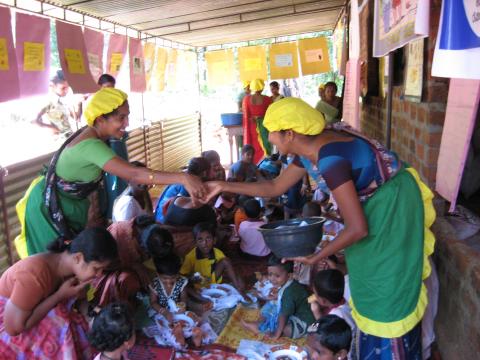Community based nutritional feeding programme yields positive results

World Vision Lanka has decided to scale up its PD Hearth programme across the country after initial experiments yielded very encouraging results during the last year.
The programme was launched in Padiyathalawa in the Ampara district which is one of the most impoverished villages in the country. A pilot project among 30 children yielded positive results and the programme was then extended to cover 871 underweight children (450 boys and 421 girls) their mothers and caregivers and the results were simply amazing.
Of the 871 children, 762 (87.5%) had weight gains of 0-600 grams in just 12 days. After a further three weeks, more than 300 children had ‘graduated’ to the ‘correct weight’.
Positive Deviance (PD) Hearth is a community based nutritional feeding programme for children who are at risk of malnutrition. It has enabled hundreds of communities to reduce their levels of childhood malnutrition and to prevent malnutrition of its future generations.
The “positive deviance” approach is used to find uncommon beneficial practices by mothers or caretakers of well-nourished children from impoverished families. Once identified, the goal is to spread these practices and behaviours to others in the community with malnourished children.
A “Hearth” is the setting of the nutrition education and rehabilitation part of the programme. Suggesting a family around a fireplace or kitchen, Hearths are carried out in home settings where caretakers and volunteers prepare “positive deviant foods”. They practice beneficial child care behaviours and feed malnourished children with extra energy rich/caloriedense supplemental meals.
A 12-day training programme for mothers covers all aspects of child healthcare with a strong emphasis on nutrition choices. The programme includes classes in cooking using locally available ingredients to create balanced diets appropriate for different stages of a child’s growth.
The programme also enables families to sustain the rehabilitation of their children on their own by using easily available local resources. It also prevents future malnutrition among the children in the community by changing community norms in childcare, feeding and good health practices.
Malnutrition has been the underlying cause of most deaths due to disease and World Vision has intentionally focused its efforts on improving the nutritional intake of children under five and pregnant and nursing mothers.
World Vision Lanka has intentionally woven its strategy around the MDGs and has been supporting the country’s efforts at reaching its targets through a range of programmes and activities in Health and Nutrition, Education, and Water and Sanitation. A key area of focus is MDGs 4 and 5 pertaining to maternal and child health.